Analysis: Ambiguities abound in proposed Bloomington law on occupancy affidavits for renters
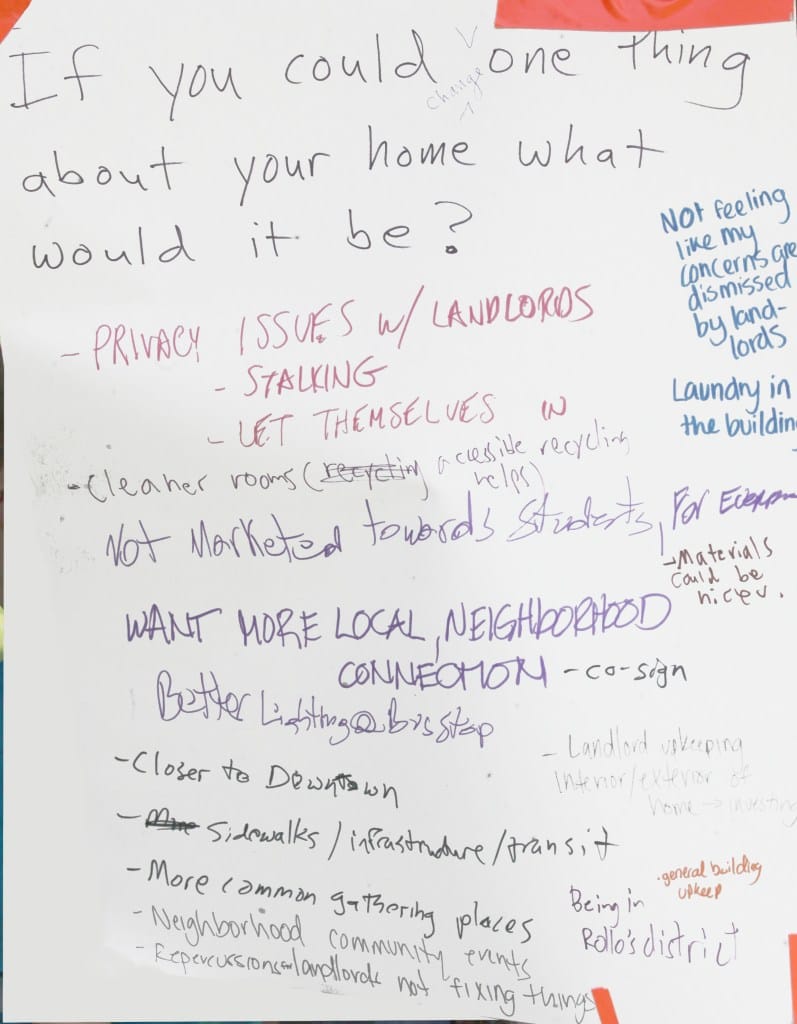
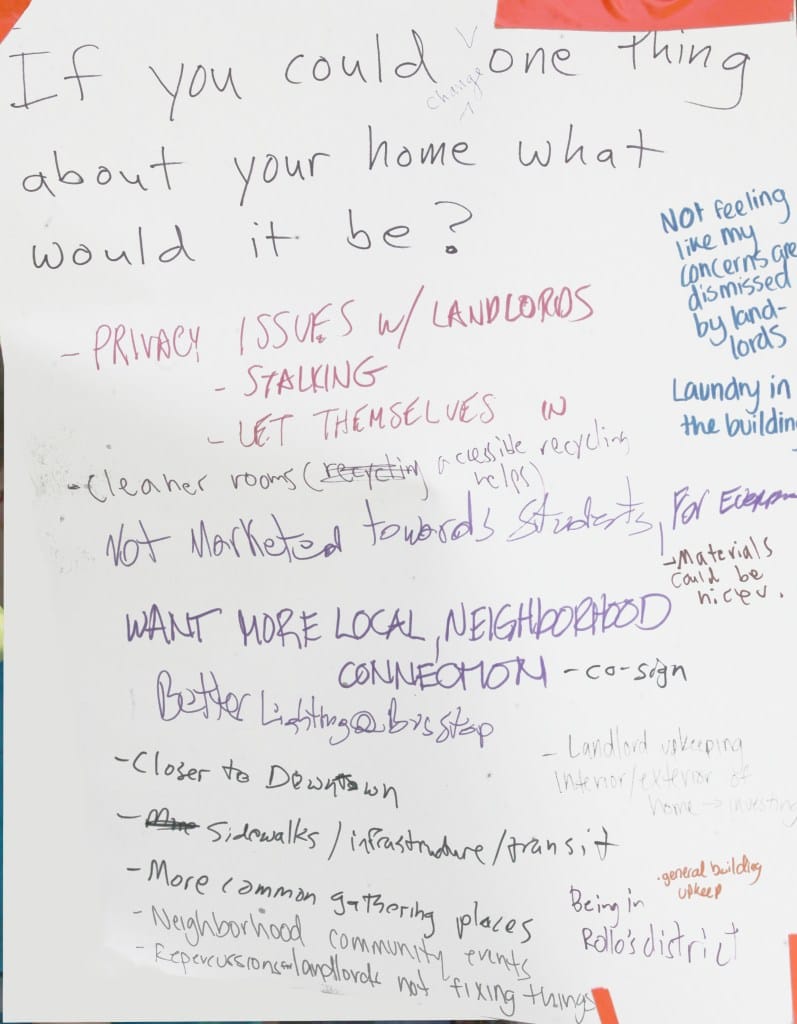
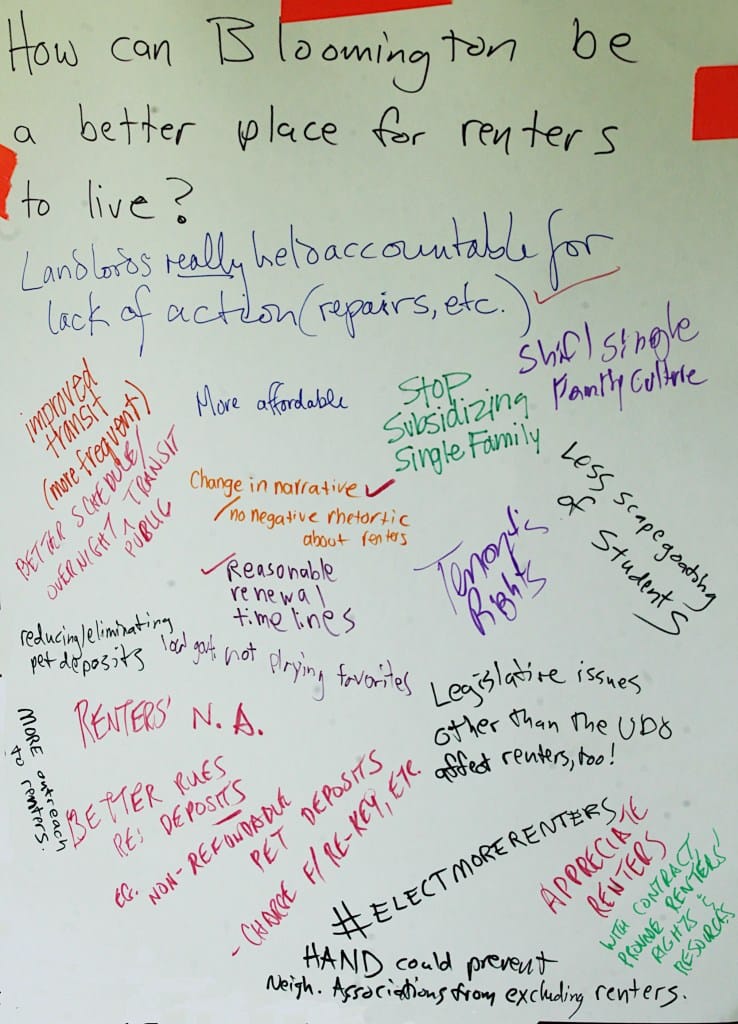
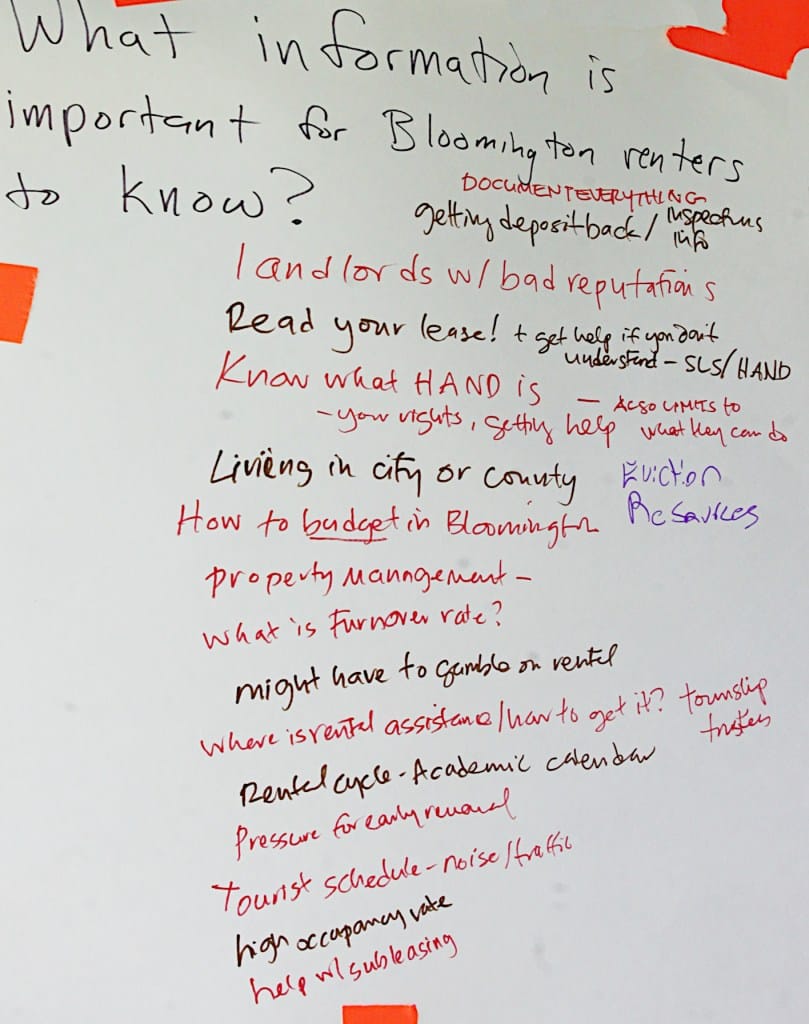
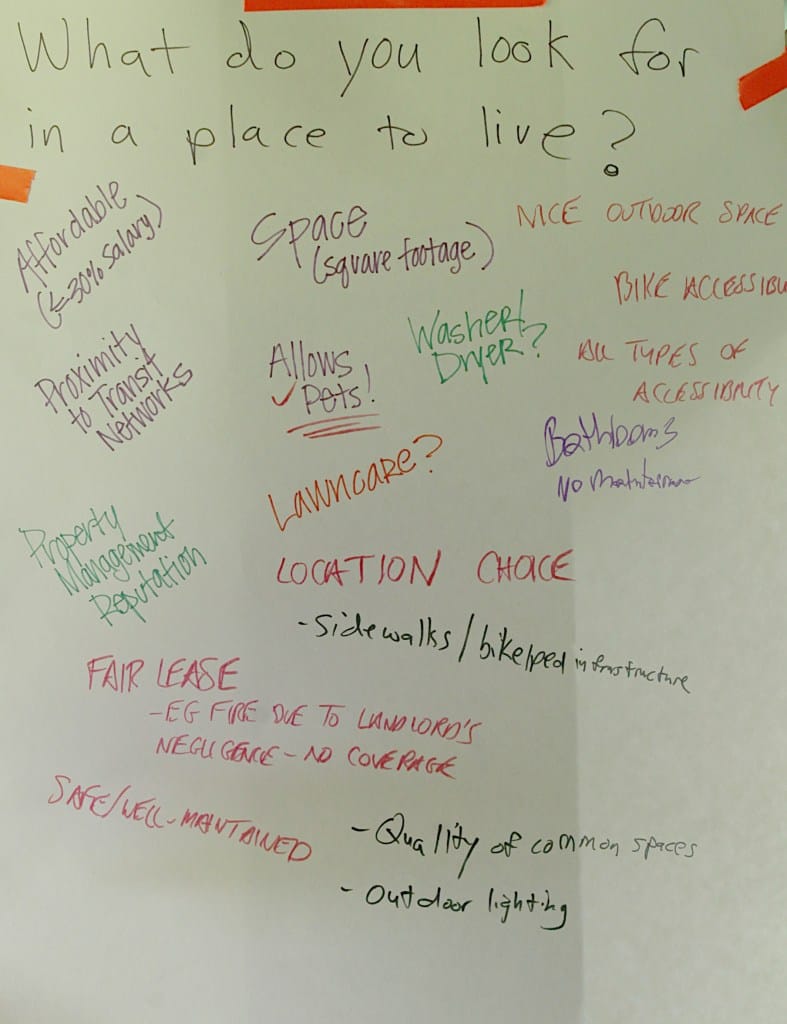
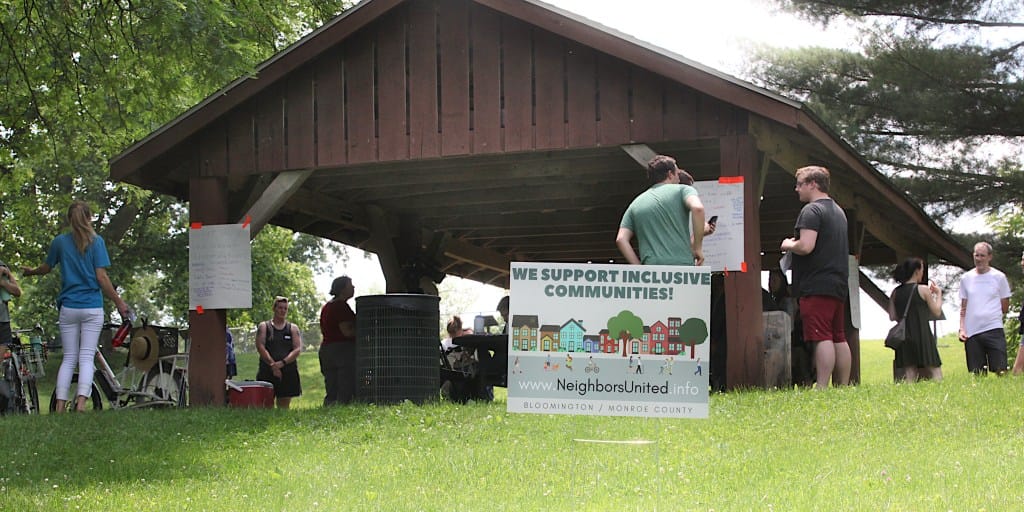
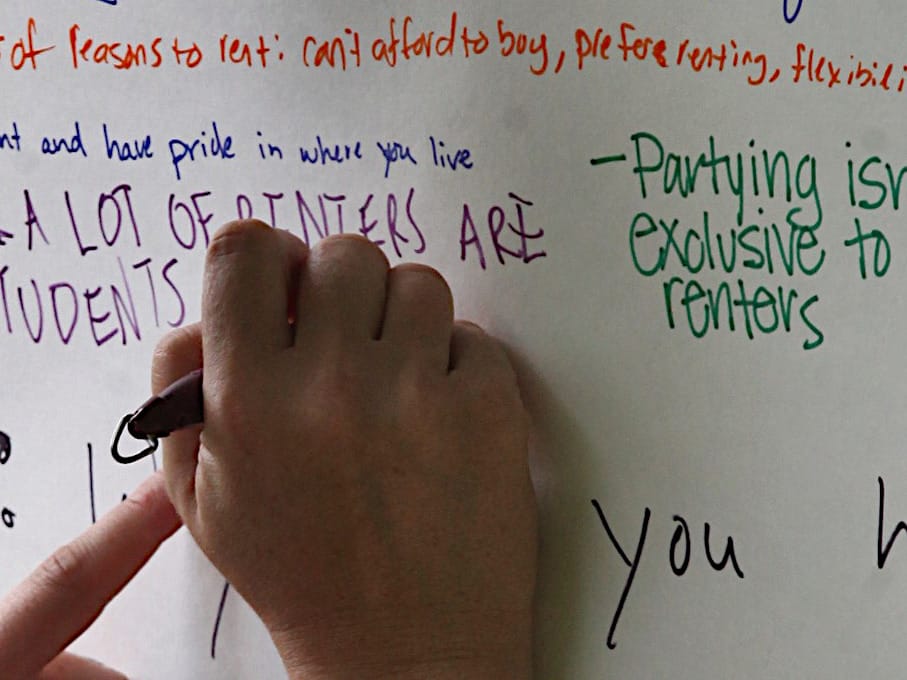
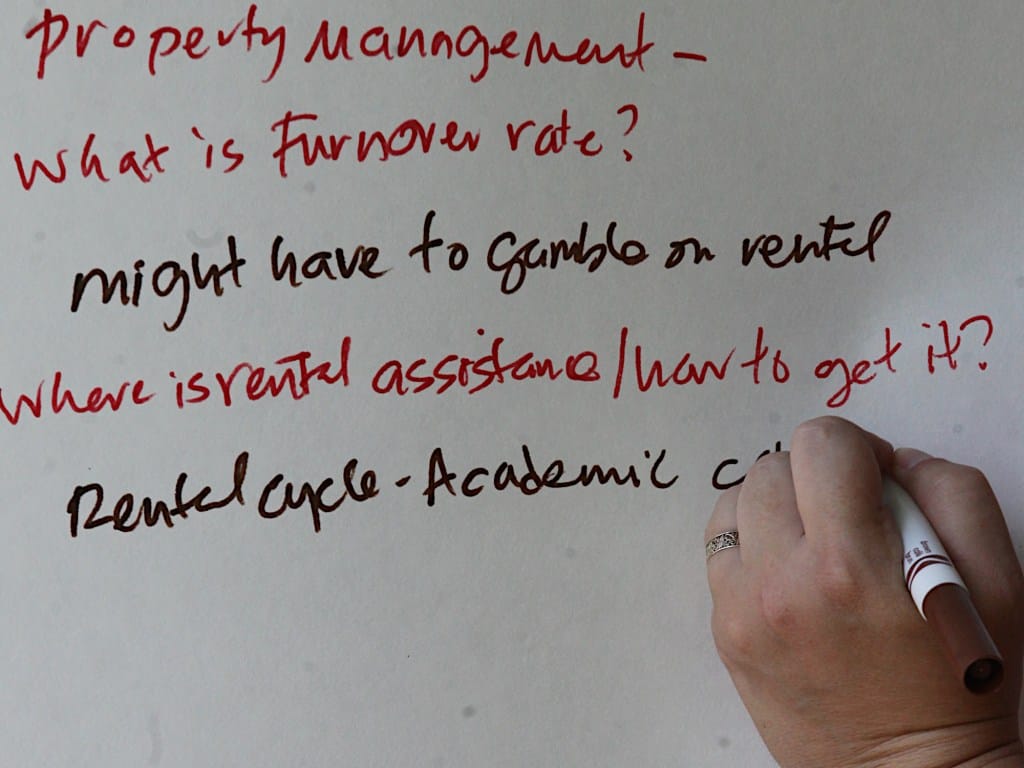
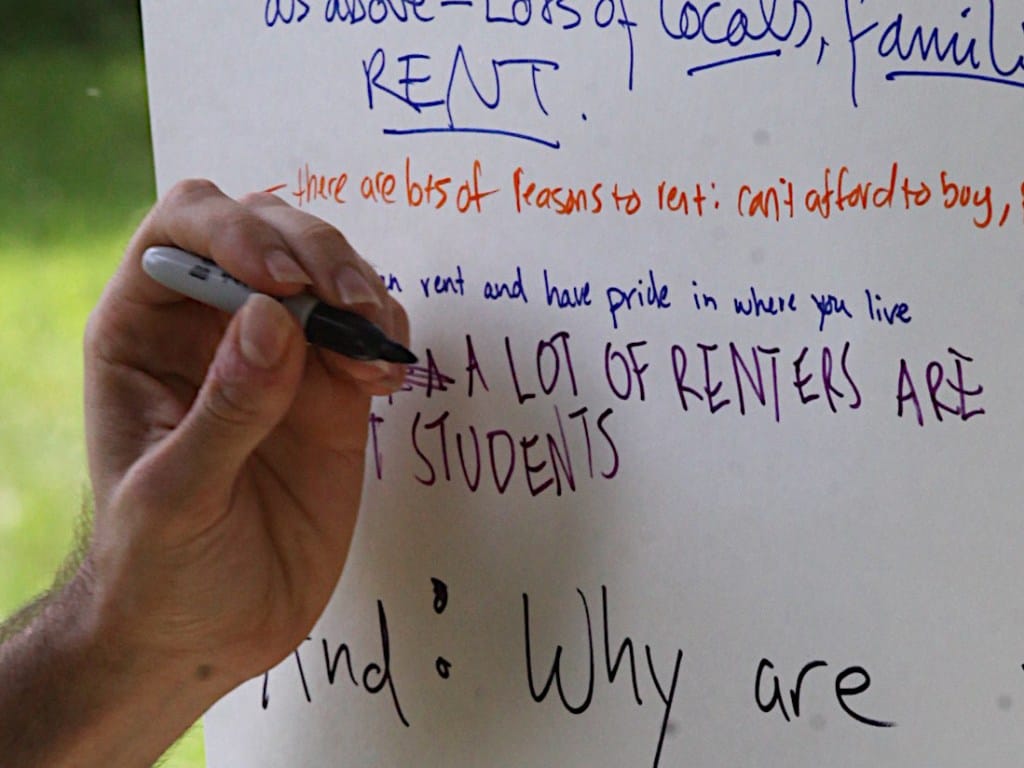
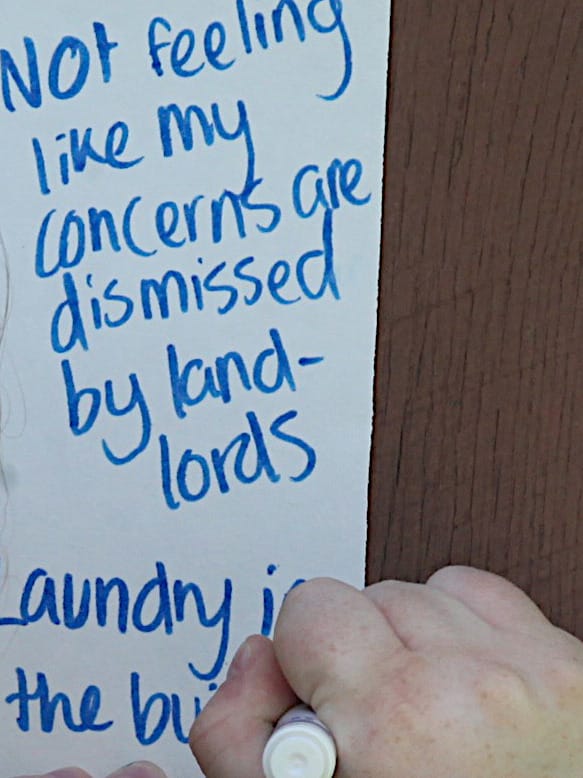
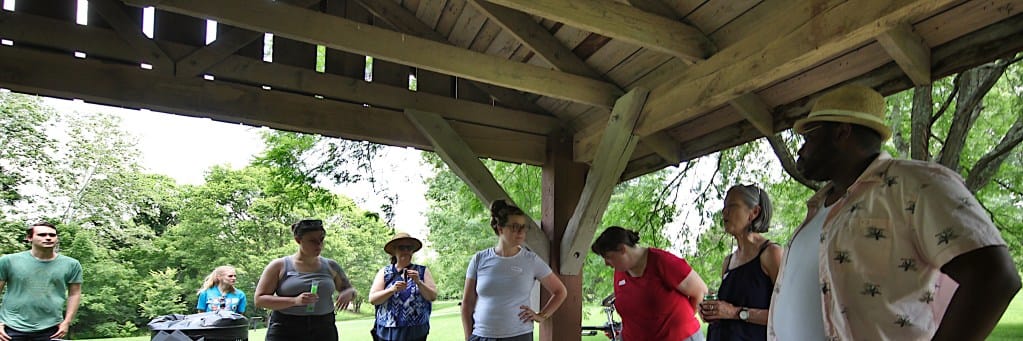
This week, Bloomington’s city council will again consider an ordinance proposed by the administration that would require occupancy affidavits for many rental properties in the city.
At their Wednesday meeting, councilmembers could be hearing from some renters whose voices they haven’t heard before.
That’s because on Sunday afternoon, at Rev. Ernest D. Butler Park on Bloomington’s northwest side, a group called Neighbors United hosted a gathering meant to attract current renters to take a leadership role in forming a renters association in Bloomington.
Of the roughly 20 attendees on Sunday, half were renters. The talking point that wrapped up Sunday’s gathering in the park was the city council’s consideration of the city administration’s proposed new local law on occupancy affidavits.
The ordinance requires an affidavit—that gives the names of renters and presumably ties them to an address—to be signed by the landlord and tenants and filed with the city. It applies just to units in buildings with four or fewer units, unless a complaint is made about some unit in a building that has more units.
Some of the sentiment shared on Sunday about the proposed new ordinance included the kind of concerns that led the city council two weeks ago to postpone a vote on the proposed new local law. The new law would appear to have the potential of creating public documents that could expose, for example, the current living arrangements of survivors of domestic violence.
One approach the city could take is to restrict access to the affidavits to a narrow set of staff members and to use an exemption in Indiana’s Access to Open Records Act (APRA) to redact affidavits, if they were requested by a member of the public.
In addition to privacy concerns, some of the complaints that have been filed through the city’s uReport system about possible over-occupancy situations, raise questions about the definition of an occupant.
A renters association?
Neighbors United (NU) was formed in the run-up to the most recent consideration of revisions to the city’s unified development ordinance (UDO) earlier this year. The group advocated for less restrictive zoning for duplexes, among other things. Anchoring the other end of the spectrum of opinion on the UDO was a group called Stop Bloomington Upzoning.
On Sunday, a co-founder of NU, Deborah Myerson, told the gathering that the head of the city’s housing and neighborhood and development (HAND) department, John Zody, had asked her if she could speak on behalf of renters, in connection with the occupancy affidavit. It’s Zody’s department that will be responsible for administering the ordinance.
Myerson reported that she told Zody she couldn’t speak for renters—because she’s not a renter.
Also non-renters are other NU founding members like Dave Warren, Cathi Crabtree, Mallory Rickbeil, and Jessika Griffin, who also attended Sunday’s gathering. The sole renter among them is Vauhxx Booker, who was also on hand on Sunday to encourage some of the renters who attended to step forward to help organize a renters association.
The role of NU in the formation of a renters association for Bloomington was described as an incubator.
uReports on over-occupancy
One of the ways the city receives complaints about over-occupancy is through its uReport system, HAND director John Zody told city councilmembers at their meeting two weeks ago.
In response to a records request from the B Square made on June 3, 2021 under Indiana’s Access to Public Records Act (APRA), the city of Bloomington produced 15 such complaints.
For complaint #173764, the uReport record shows the complaint was initiated on Sept. 21, 2020. But it was not closed until June 7, 2021, four days after the B Square’s request and the same day the response was delivered.
The uReport notation about complaint reads #173764: “These units are allowed to have 4 bedrooms, but only 3 unrelated adults and their dependent children, or a family of any size can live there.”
That’s the heart of the existing law that the city of Bloomington is trying to enforce with the new law on occupancy affidavits. In the basic residential zoning districts of R1, R2, R3, and R4, Bloomington’s unified development ordinance (UDO) sets a limit of three for the number of unrelated adults who count as a family. In other districts, the limit is up to five unrelated adults.
The number of adults who are related by blood or marriage is not restricted by the UDO’s definition of a family.
The table below summarizes the complaints produced by the city of Bloomington under the records request. [Shared Google Sheet of table]
Table: Examples of uReport Over-occupancy Complaints
| Date | Complaint | Response | Status |
| 2021-04-16 | This is an over-occupancy complaint. The house at 501 South Arbutus appears to be inhabited by more than three unrelated adults. | Person who entered this case called and stated they had spoken with the landlord and the issue is resolved. | closed: resolved |
| 2021-03-03 | Property appears to be Over Occupied. Several cars and people in and out all of the time. Possibly an Unregistered Rental. | Conducted partial tenant interview 3.29.20. Sent Notice to register/notice to schedule. Please follow up through Rental System. | closed: resolved |
| 2021-03-01 | scattered trash in yard. Also possibly over occupied | Valid issued citation | closed: resolved |
| 2020-11-04 | Too many accessory Buildings. Appears to be violating occupancy limits | Staff have investigated this site, but due to the location of the property, we could not see into the back yard well enough to determine how many accessory buildings are there/what they are. Because the complainant did not submit contact information with their uReport, we are unable to contact them for additional information. The Planning & Transportation Department conducts investigations from the public right-of-way only, so our observations are restricted to what can be seen from there. | closed: can’t fix |
| 2020-10-22 | Possible unregistered rental/over occupancy; The home was nely purchased in June-two adult kids of the owners live there (one is on the deed). Frequently 4 cars are in the driveway (2 without neighborhood permits). Neighbors are concerned, but want to remain anonymous | Have not found indication of over occupancy. Will make another effort to stop at the residece to speak with the tenants. | closed: resolved |
| 2020-10-07 | Tenant below this property states that there are more than 5 occupying this unit, and that they have been up all hours of the night making noise. The noise problem has been reported with no result. Tenant is unsure what else can be done. But sure the unit is over occupied | The property is occupied by a family with a toddler. Verified at cycle re-inspection | closed: invalid |
| 2020-09-21 | Received notice that the properties at 3946,3950, and 3962 E 10th Street are being sold. Sale notice states that units are together are a total of 12 bedrooms, however, occupancy load for each is 3. | These units are allowed to have 4 bedrooms, but only 3 unrelated adults and their dependent children, or a family of any size can live there. | closed: can’t fix |
| 2020-09-09 | Property appears to be over-occupied. Several cars parked in drive at all times | Have started the over occupancy investigation | closed: resolved |
| 2020-09-09 | Property appears to be over-occupied. Several cars parked in drive. Property is also not in the system as a Rental. Owners have a different address. Possible unregistered rental. | Does not show up as a registered rental. Will sent Notice to Register and Noce to schedule for this property. Will address Over Occupancy question when property is inspected. | closed: resolved |
| 2020-08-26 | over-occupancy: property has occ. load of 3, but 4 people there (owner looks the other way) | Have begun investigation regarding this property | closed: resolved |
| 2020-02-13 | Complainant says this property is over occupied. | Have started the process to try and determine if the property is over occupied. Will monitor and take appropriate measures as needed. | closed: resolved |
| 2019-12-06 | Possible over occupancy of rental property. | Tenant lives here with seven children. Not valid. | closed: invalid |
| 2019-11-26 | Trash overflowing cans and strewn on shared driveway. Also possible over-occupancy. Property owners plus their grown children/grandchildren and various others. Garage might be being used as living quarters. Many cars parked in driveway/circle/neighboring driveway (which is a rental). | Will monitor. Have been by several times. Many cars but not trash or cans at curb. Garage is being used as a garage. This property is not a rental. | closed: resolved |
| 2019-09-04 | Suspected over-occupancy. Property is limited to 3 unrelated adults. There are 4 cars in the driveway. | Stopped at property and spoke to a young lady who said 3 people live there but a 4th girl stays a lot. Explained the occupancy allowed at that property. Left a card for the owners to call me. Will continuously monitor. | closed: resolved |
| 2019-08-30 | 1500 s highland – still has cars parked on lawn and sidewalk. Is this an over occupied rental? | This has already been reported. Planning & Transportation is enforcing upon the parking on an unimproved surface that is not within the right of way. Parking Enforcement is doing patrols and ticketing any vehicles parked on the sidewalk or tree plot. Staff is forwarding your concern regarding overoccupancy to the Housing and Neighborhood Development (HAND) Department. | closed: duplicate |
Need for relationship information independent of number?
The wording of the proposed Bloomington ordinance requires landlords and tenants to provide information about the relationships between tenants, no matter how many tenants are listed on the affidavit: “[E]ach occupancy affidavit shall include the name of each occupant and identify the familial relationships, if any, among the occupants.”
If the number of adult tenants is three or fewer, then the leasing arrangement is legal in any of the city’s zoning districts, no matter what the relationship is among the tenants. Only in cases where the number of occupants is four or more does it sometimes become important to establish the relationships between tenants.
In an R1 zoning district, for example, if a renter is leasing a single-family house, and the landlord records four people on the affidavit as occupants, it would have to be the case that the four people have a relationship covered by blood or marriage.
In all those cases where the number of tenants is three or fewer, the ordinance looks like it would require the over-collection of relationship information.
What is an occupant?
For complaint #170219, the note from the HAND officer says:
Stopped at property and spoke to a young lady who said 3 people live there but a 4th girl stays a lot.
That raises the question of what an occupant is. Many landlords have clauses in their leases that regulate whether guests are allowed to stay over and if so, how many nights in a row, or cumulatively, they can stay.
Independent of the wording in a lease, does someone who “stays a lot” count as an occupant for the purposes of enforcing Bloominton’s zoning code?
What is a complaint?
As drafted, Bloomington’s ordinance is confined just to units in buildings that have four units or fewer—unless there’s a complaint about over-occupancy in a unit.
In buildings with more than four units, the requirement of an occupancy affidavit “is waived unless a complaint is made about occupancy concerning the residential rental unit.”
Could someone file a complaint about every rental unit in the city, thereby nullifying the waiver for any rental unit, thus requiring all the rental units in the city to be subject to the ordinance?
City attorney Mike Rouker responded to that B Square question in an email. He described the HAND director’s discretion to “limit off-cycle inspections that are based on complaints that appear to be overly broad or not motivated by a genuine over-occupancy or other concern.” Rouker pointed to Bloomington Municipal Code 16.03.040(c): which says:
(c) Off-cycle or complaint inspections of a residential rental unit may be conducted at the discretion of the director upon the following:
(1) Receipt of a written request of any resident of the city, any governmental agency or employee, or the residential rental unit’s tenant, the tenant’s legal representative, the owner, or the owner’s agent provided the request indicates that there is some violation of this title at the stated residential rental unit; or
(2) The director has probable cause to believe the residential rental unit is in violation of this title.
Will HAND need more resources?
The number of rental units subject to the ordinance has an impact on the amount of additional work the HAND department would have to do, if the ordinance is enacted.
The city’s dataset of registered rentals shows nearly 30,00 records. Among them are 2,780 single-family houses, which would definitely be subject to the ordinance.
Based on a tally of addresses in the dataset that have four or fewer entries, the number of properties in the dataset that seem like they have potential to be subject to the new ordinance could be as high as around 7,800.
At the city council’s meeting two weeks ago, when a vote was postponed, councilmember Sue Sgambelluri asked about the fiscal impact, noting there did not seem to be a fiscal impact statement included with the proposed legislation.
“I’m not seeing a fiscal impact statement per se in here,” Sgambelluri said.
Zody responded by saying he’d have to get back to her about that, adding that he did not believe that administering the new ordinance would require adding additional staff.
The city code requirement of fiscal impact statements for all legislation survived an attempt made by councilmember Steve Volan in late 2020 to remove them from city code.
The result of that effort, which did not conclude until early 2021, was to preserve the requirement of a fiscal impact statement.
But the fiscal impact statement is no longer required to be submitted on a form supplied by the city council’s staff.
Filling out the form
The wording of the proposed ordinance on occupancy affidavits refers to a form by saying that the affidavit has to be submitted “on the form so provided by the HAND department.”
At the council’s meeting two weeks ago, responding to complaints about a lack of outreach to landlords and renters, Zody pointed to the wording and construction of the required form as an opportunity for collaboration: “I feel pretty confident we can collaborate, make sure that we do the very best we can with the actual affidavit form.”
Zody added, “The implementation and execution of the form, I think, is where we see opportunity for collaboration.”
But the way the form is laid out and its content are not locked in by the ordinance, city attorney Mike Rouker confirmed to The B Square. So the form that is actually used could wind up being different from the example that was provided to the city council along with the proposed legislation.
Rouker wrote: “Upon implementation and review, HAND may discover that a different form would work more effectively.”
But the form used by HAND is constrained by the wording in the ordinance, Rouker said: “[T]here are definitely limits on what the form may look like. The ordinance prescribes what information must be in the form, and the ordinance prescribes a specific penalty.”
Rouker concluded: “The form cannot create any additional penalty, and the form cannot be more invasive than what is permitted by the ordinance.”
The city council’s meeting on Wednesday, June 16, has its usual start time of 6:30 p.m. Previous coverage by The B Square is tagged with “occupancy affidavit“.
[Updated at 4:24 p.m. on June 15, 2021: A possible amendment to the ordinance has been posted as a packet addendum on around 4 p.m. the day before the council’s meeting. The amendment has been suggested by the administration, so it is still “in search of a sponsor.” One significant impact of the amendment would be to have the property owner maintain the affidavit, instead of submitting anything to the HAND department. The affidavits would have to be produced to a HAND officer or to the city, in response to a request: Here’s the link: Am 03]




Comments ()